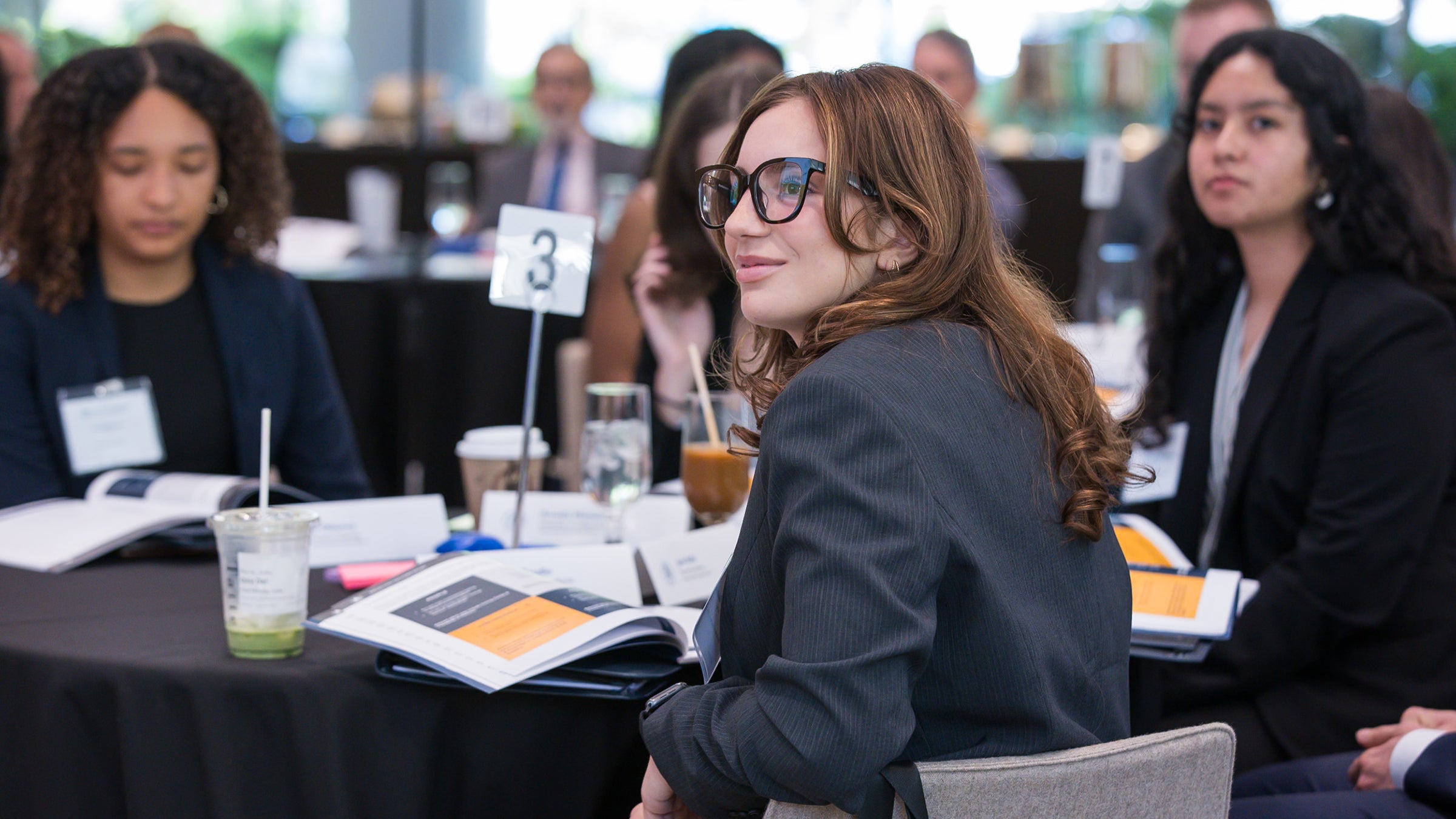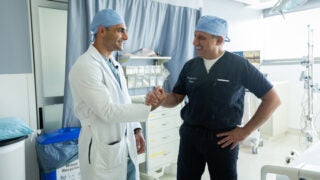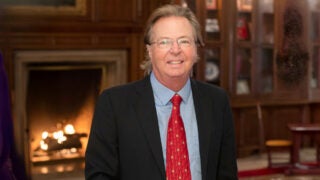
Leonard D. Schaeffer (center) says “Fight On!” with the USC cohort at the 2025 Schaeffer Fellows Summit at the USC Capital Campus. (Photo/Jason Dixson Photography)
Government internships put students on the front lines of public service
For more than a decade, the Leonard D. Schaeffer Fellows in Government Service program has supported students in high-level government internships to foster career development — and democracy.
This past summer, Izzy Del Gaudio completed a career-defining internship at SpaceWERX, the innovation arm of the U.S. Space Force in El Segundo. “I was really drawn to this role because of my interests in national security, emerging technology and public/private-sector collaboration,” says Del Gaudio, a fourth-year student at the USC Dornsife College of Letters, Arts and Sciences and master’s candidate at the USC Marshall School of Business.
As SpaceWERX’s inaugural policy intern, Del Gaudio had the opportunity to learn about dual-use space technologies that serve both public needs and national defense priorities, and to write and present her first policy memo for the U.S. Department of Defense. “It made me even more excited to pursue a career that combines innovation, defense and strategic policy,” she says.
Del Gaudio’s experience reflects the mission of the Leonard D. Schaeffer Fellows in Government Service program, which places undergraduates in high-level government internships to help them explore and pursue career pathways in public service. Each year, 50 exceptional second- and third-year students are selected as fellows — 10 from each of five universities: USC, Harvard University, Princeton University, the University of Virginia, and the University of California, Berkeley.
Undergraduate public-service internships are often unpaid, posing a barrier for many students to pursue them. The Schaeffer Fellows program alleviates that obstacle by providing each fellow with a $6,000 stipend to assist with housing, transportation and other living expenses. “Fellows are able to engage with what we love without any financial burden,” Del Gaudio says.
Since the program welcomed its first cohort of interns in 2015, it has supported 467 fellows in more than 280 federal, state and local government offices and agencies nationwide.
Government internships introduce students to the impact of public service
“Schaeffer fellows learn firsthand how government operates, the impact one can have on our society and the importance of being an engaged citizen who supports the values of our democracy throughout their lives,” says program founder Leonard D. Schaeffer, a health care executive, public service leader and philanthropist.
Schaeffer’s 2014 gift to USC and Princeton University, the first two participating schools, set the program in motion. At USC, Schaeffer holds the Judge Robert Maclay Widney Chair and serves as a professor, member of the Board of Trustees and chairman of the USC Health System Board, which oversees Keck Medicine of USC.
When he was an undergraduate at Princeton, Schaeffer interned for Illinois Sen. Paul Douglas, an experience that ignited his interest in government and policy and served as his inspiration for the Schaeffer Fellows program.
“Government service often provides students with greater opportunities for responsibility and impact than in the private sector, and it can be enormously gratifying working on such interesting and important public policy issues,” says USC Interim President Beong-Soo Kim, whose own career path included stints in both local and federal government service. “By inspiring such amazing students to pursue careers in civic leadership, the Schaeffer Fellows program brings into the government precisely the talent, innovation and public spirit we need.”
Multiple routes into government
Fellows can opt to be matched with an internship at one of the program’s partner agencies or secure an internship independently. In some instances, such as Del Gaudio’s internship at SpaceWERX, government agencies and offices create internship opportunities in response to outreach by the Schaeffer Fellows program’s administrators.
“I never would have had access to this type of niche and forward-thinking role without the Schaeffer program’s support,” Del Gaudio says.
For Samara Holloway, a fourth-year student at USC Dornsife and USC Marshall, getting matched with an internship last summer at the Office of Exposition Park Management shifted her career goals in a new direction. When she began the internship at the government agency, which oversees the 160-acre park adjacent to the USC University Park Campus, Holloway had no government service expertise and was considering a career in the business sector.
She relished projects such as helping to facilitate community focus groups that informed the park’s planning for the 2028 Olympics. “I didn’t realize that public service work could be made into a career,” says Holloway, who now plans a career in government or legal service. “The internship pointed me in the direction that I want to go and gave me the confidence to follow my heart.”
Similarly, a 2023 internship at the San Francisco office of the General Services Administration — a marketplace for government contracts — helped Vincent Cisneros ’24 discover his passions for using analytical tools and enhancing organizational effectiveness. He secured the internship independently and was accepted to a track that allowed him to stay on as a part-time employee during his final year at USC and a full-time employee following graduation.
“I thought it was unique to use technology to improve government agencies’ ability to serve their constituents,” says Cisneros, a graduate of the USC Price School of Public Policy who now works in community development and housing as an analyst for Harris & Associates in Irvine. “It’s a side of government that I previously didn’t know existed.”

A supportive introduction to professional life
Fellows from across the country come together for a virtual orientation before their internships begin, a midsummer professional development summit held in Washington, D.C., and fall events at their respective universities that recognize fellows’ contributions to public service. While each partner university selects its own fellows, the program’s common aspects are centrally administered at USC by the program’s administrators, Executive Director Erica Lovano McCann and Assistant Director Willa Erickson.
Grounded in the program’s key themes, these events prompt students to reflect on their core values, gather leadership lessons, develop strategies for collaboration and networking, and cultivate transferable skills. Each fellow also receives one-on-one mentorship from an alumnus of their university, who is often also an alumnus of the program. Even if fellows decide not to pursue careers in government, these activities help them “translate the skills and insights from their internships into any path they pursue,” Lovano McCann says.
The latter proved true for alumna Jamie Kwong, BA and MA ’18, now a London-based Nuclear Policy Program Fellow at the global think tank Carnegie Endowment for International Peace. Kwong’s 2016 internship with the U.S. House Foreign Affairs East Asia and Pacific Subcommittee was pivotal in launching her career as a nuclear policy researcher.
That summer, Kwong set up informational interviews with about 50 people working in international relations — some of whom Schaeffer personally introduced her to. Through those conversations, she learned about how think tanks conduct research geared toward policymakers. “Being on Capitol Hill gave me an opportunity to understand a pathway I could follow,” says Kwong, who went on to be selected for the Marshall Scholarship program and complete her doctorate in war studies at King’s College London.
Connection to the U.S. capital
In 2024, a $59 million gift from Schaeffer and his late wife, Pamela, established the USC Schaeffer Institute for Public Policy & Government Service, which is anchored at the USC Capital Campus in Washington, D.C., as well as the University Park Campus. The institute now serves as a permanent home for the Schaeffer Fellows program, securing its endowment and supporting expanded opportunities. From now on, the Schaeffer Fellows annual Washington, D.C., summit will be held at the USC Capital Campus building.
The summit, which takes place over four days each June, is a perennial favorite of the fellows, whose airfare, hotel accommodations and meals are paid for by the program. Fellows get to meet like-minded peers from across the country, alumni of the program and prominent public service leaders from various areas of government. Through interactive workshops, networking opportunities and panel discussions, the summit fosters a sense of camaraderie among the cohort and prepares fellows with tools to excel in their internships and beyond — including personalized business cards to hand out as they make new connections.
Fellows also participate in group tours of D.C. landmarks like the U.S. Capitol and national museums. For many, the trip marks their first visit to the nation’s capital. “It’s a really unique opportunity being in D.C., in the heart of it all,” Cisneros says. “I’ve kept in contact with a few of the fellows from the summit, and it’s been rewarding to make those lasting bonds.”
“To sit in Washington, D.C., and be surrounded by so many people who are so passionate about public service is just a spectacular experience,” Del Gaudio says. “I came home feeling excited and even more motivated to continue on this public-service journey because I felt like I had found my people.”
A robust alumni network
Alumni of the fellowship find that participation in the program gives them a leg up as they move forward in their college careers and professional journeys. Holloway describes the program as a “launching point” that has opened doors to additional internships at the Los Angeles County Public Defender’s Office and JVS SoCal, a workforce development nonprofit. Some alumni, like Cisneros, find permanent employment at the agencies they interned in. Others, like Kwong, are chosen for prestigious research fellowships.
For Del Gaudio, who is beginning to enter the job market, the SpaceWERX entry on her résumé has already garnered favorable reactions from prospective employers. But she stresses that the professional development aspect of the Schaeffer Fellows program is just as valuable as its résumé-building potential. As she applies for jobs, she finds herself reflecting on the core values she articulated during the summit.
“I want to make sure my first career decisions are driven by my values and not by any external validation,” Del Gaudio says. “I added something significant to my résumé this summer — but I also grew as a person.”
Lovano McCann notes that alumni increasingly choose to stay engaged with the program in the years post-graduation. They contribute as mentors, participate in alumni panels and host social events in their areas.
Kwong, for example, mentors fellows virtually from London and serves as a member of the Schaeffer Fellows Advisory Board. “I try to pay back what I was given that summer,” she says.
When the program first began, Lovano McCann did not anticipate having such a dedicated alumni network. “They have shown a strong interest in staying involved with the program and each other,” she says. “Over the next decade, one of our primary priorities will be developing resources, programs and professional networks to support them in any career.”



